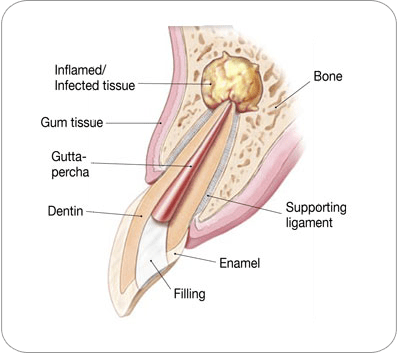Endodontic Surgery
In a few cases, however, nonsurgical endodontic treatment alone cannot save the tooth. In such a case, your dentist or endodontist may recommend surgery.
Why would I need endodontic surgery?

Surgery may be used in diagnosis. If you have persistent symptoms but no problems appear on your x-ray, your tooth may have a tiny fracture or canal that could not be detected during nonsurgical treatment.
Sometimes calcium deposits make a canal too narrow for the cleaning and shaping instruments used in nonsurgical root canal treatment to reach the end of your root. If your tooth has this “calcification,” endodontic surgery may be able to clean and seal the remainder of the canal.
Usually, a tooth that has undergone a root canal can last the rest of your life and never need further endodontic treatment. However, in a few cases, a tooth may fail to heal. The tooth may become painful or diseased months or even years after successful treatment. If this is true for you, surgery may help save your tooth.
Surgery may also be performed to treat damaged root surfaces or surrounding bone. Although there are many surgical procedures that can be performed to save a tooth, the most common is called apicoectomy or root-end resection. When inflammation or infection persists in the bony area around the end of your tooth after a root canal procedure, your endodontist or oral surgeon may have to perform an apicoectomy.
What is an apicoectomy?



Will the procedure hurt?
Local anesthetics make the procedure comfortable. Of course, you may feel some discomfort or experience slight swelling while the incision heals. This is normal for any surgical procedure. Appropriate pain medication will be prescribed to alleviate your discomfort.
Who will perform your surgery?
An oral surgeon may be recommended by your endodontist to perform the necessary endodontic surgery. Their experience and surgical suites offers additional options for sedation during the procedure.
How will I know that the surgery will be successful?
Your dentist and endodontist, as a team, are suggesting endodontic surgery because they believe it is the best option for you. Of course, there are no guarantees with any surgical procedure. We will discuss your chances for success so that you can make an informed decision.
What are the alternatives to endodontic surgery?
Often, the only alternative to surgery is extraction of the tooth. The extracted tooth must then be replaced with an implant, bridge, or removable partial denture to restore chewing function and to prevent adjacent teeth from shifting. Because these alternatives require surgery or dental procedures on adjacent healthy teeth, endodontic surgery is usually the most cost-effective option for maintaining your oral health.
No matter how effective modern tooth replacements are – and they can be very effective – nothing is as good as a natural tooth. You’ve already made an investment in saving your tooth. The pay-off for choosing endodontic surgery could be a healthy, functioning natural tooth for the rest of your life.
